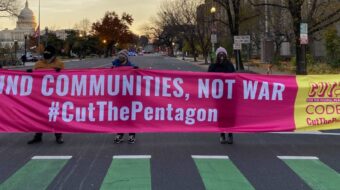Public health workers and activists worldwide are angry at the Central Intelligence Agency for using a sham immunization program as a method to get at the late Al Qaeda leader Osama Bin Laden, who was killed in a U.S. attack on his compound in Abbottabad, Pakistan on May 1 of this year.
In the search for Bin Laden the United States Central Intelligence Agency hit upon an ingenious scheme. Immunization shots against Hepatitis B would be offered to the poor people of Abbottabad, hiding the fact that this was a CIA front program. As children came to be vaccinated, it is possible that blood samples were taken and the DNA compared to that of one of Bin Laden’s sisters, who had died in New York in 2010. If that indeed happened (there is no certainty how far the plan got), a genetic match would indicate a high possibility that Bin Laden was living in Abbottabad, and perhaps even where, exactly, he resided.
Whether in fact the targeting of Bin Laden’s compound was the result of this false front immunization program or not is not clear, and is not what public health workers around the world are objecting to. Rather, the indignation is caused by the worry about how such a misuse of a vitally needed public health program might impact other public health projects, the people working in them, and – most of all – the people meant to benefit from them.
This brings up memories of my own graduate student days. As a masters and doctoral student in the Department of Anthropology of Northwestern University from 1966 to 1974, I became aware, as did many others, of the attempts of the Central Intelligence Agency and other U.S. government branches to corrupt U.S. scholarship by using it as an espionage and counterinsurgency front. This was during the height of the Vietnam War, when millions of people in the United States were waking up to what our government was really up to in other countries.
A student assistant had exposed the fact that a high-powered scholar was working to help the U.S. military plan the targeting of villages in Vietnam. A highly respected Latin America specialist was revealed to have been working with U.S. Naval Intelligence on a project, eventually aborted, to prepare the ground for subversion against a possible left wing government in Chile (where, in 1973, socialist President Salvador Allende was indeed overthrown by a military coup, with major U.S. connivance).
Many of us anthropology graduate students indignantly rejected this prostitution of our discipline, and all of us suddenly realized that if the CIA. used some of us in its espionage and destabilization work, all of our careers and perhaps even our lives would be endangered. Cultural anthropologists traditionally obtain their doctoral degrees by the presentation of a thesis prepared on the basis of extended face-to-face research “in the field,” often in foreign countries. Even the most ideologically blinkered among us realized that the actions of the CIA and its academic collaborators would make us all look like possible spies in the eyes of the governments of the countries where we might be working, and in also of the people with whom we would have to talk every day to do our research.
At the annual meetings of the American Anthropological Association in Seattle, Washington in 1967, others and I lobbied to get a resolution passed declaring cooperation with the CIA and other such agencies to be a violation of professional ethics. We were disappointed to find senior colleagues, whom we admired for their scholarship, taking a negative attitude toward our proposals, or even angrily condemning us for interfering with their God-given right to take research money from whomever. However, some weak measures were taken.
My own reaction was to radically re-asses my concept of a career trajectory, eventually giving up on the idea of doing any social research outside the United States whatsoever. And if the powers that be were willing to corrupt scholarship abroad, they might be doing so within the United States as well. So the only way to be a scholar with integrity one had to also be a committed activist, with eyes wide open about the nature of the system.
The work of public health people is far more important than the careers of a few American and Western social scientists, because the lives of millions depend on it. Yet it has been jeopardized also.
Now international organizations such as Medecins sans Frontiers (Doctors Without Borders), UNICEF and the Red Cross are working overtime to overcome new suspicions that will arise against people who are making an honest effort to deal with major public health crises such as HIV-AIDS, cholera, and similarly horrific things, and who now have to be worried that they will be targeted as “spies”.
And we in the United States must draw the lesson that as long as capitalism, and especially imperialism, exists, every noble human endeavor is in danger of being undermined, corrupted and prostituted.
The sooner we can end this evil system, the better.










